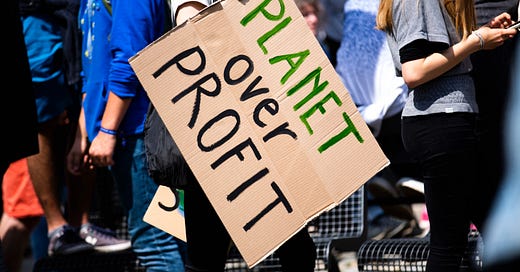Making the invisible "visible"
Sometimes the invisible will be "good news", giving you hope and making you believe in humanity, technology, the future. But sometimes just the opposite can happen. Alas let's see the "invisible"
I have been pondering about the content for Rekind Post. The hopeful in me says let’s focus on the positive news, the good deeds, the actions that bring the promise of a better future. Then I think about the reports I read, the news I follow and I remind myself of my mission: “Make the invisible visible”!
Sometimes “the invisible” is positive news! Other times “the invisible” is what we don’t see because of the algorithms on social media, who we follow, what posts we choose to comment on or simply we do not see for any given reason.
Let’s start with the good news
There is a growing awareness and understanding of the connection between human behaviour and the loss of species and ecosystems. And consumers now want to be part of the solution, according to this recent report by WWF. The key highlights of the report are:
The UK and the US (Concerned and Searching): 90% of adults said that protecting the environment was important to them according to a study conducted in 2020, and three-quarters were concerned about biodiversity loss in England. The popularity of Google searches for sustainable products grew by 800%. The popularity of Google searches for sustainable products grew by 450% between 2016 and 2020 in the USA
China (To consume or Not to consume!): The percentage of respondents from China who agreed with the statement “We need to consume less to preserve the environment for future generations” increased from 75% to 83% between 2019 and 2020. This is particularly interesting because Chinese consumption is expected to double by 2030 and reaching to volume close to the American consumers (guess who consumes the most!)
Brazil (Highest rate of deforestation in the Amazon in 2020) With Jair Bolsonaro, accused of crimes against humanity and ecocide, the volume of news stories about nature loss and biodiversity increased by 148%. News articles about nature protests peaked in 2019, following a 79% increase since 2016.
Asia Loading: The most dramatic growth in engagement and awareness has occurred in Asia, most notably India (190%), Pakistan (88%), and Indonesia (53%). People all over the world care about nature, and that trend is growing—especially in emerging markets. This shift in public sentiment reflects a hard reality, as people in emerging markets are most likely to experience the devastating impact of the loss of nature
Why do you think this report only looked at Twitter trends and Google searches to track behaviour?
What about Facebook?
Facebook is committed to addressing ‘Climate Change’, says the FB officials. Great but your actions are your deeds Facebook and we don’t see much of it!!!
Facebook’s business model is based on a monetary system that people can pay money to say what they want without any fact-checking, leading to funding hate crimes, climate deniers, and land rights violations. This is the D(M)information era in the age of Digital Information. And here is the evidence presented by this recent independent report ‘Stop Funding the Heat’ :
Facebook’s Public Policies don’t include any action or acknowledgement on Climate Misinformation.
Facebook has Third-Party-Checking but not for “Climate Change Information”.
Facebook’s Advertising Policies mention discrimination, health misinformation, political misinformation, with even a specific clause on vaccines, but there is no mention of "Climate Change”.
According to InfluenceMap's research, of the 51 climate science disinformation ads that were identified, only one of them was taken down. The climate disinformation ads ran over a 6 month period, gaining 8 million individual impressions (if extrapolated over the last 5 years, this number would equate to 70 million impressions).
Photo: Markus Spiske
And the final good news that shook the Big Oil and the new Shareholder Activism
In a historic decision, A court in the Hague has ordered Royal Dutch Shell to cut its global carbon emissions by 45% by the end of 2030 compared with 2019 levels, in a landmark case brought by Friends of the Earth and over 17,000 co-plaintiffs.
And then this happens!
Who knew that activism or shareholder activism could move mountains in an oil company? And IT DID!!!
Engine No. 1, a minority shareholder, successfully replaced two Exxon board members to help steer the big oil company towards a greener strategy.
Meanwhile, a majority of Chevron shareholders rebelled against the company’s board favouring an activist proposal from, Dutch campaign group Follow This, to force the group to cut its carbon emissions.
Before getting into the nitty-gritty of changing shareholder activism (next newsletter), I leave you with this image of the world’s biggest polluters list as a reminder that yesterday’s win is no small incident.
It is up to us all to make the ‘invisible’ ‘visible’ so please leave a comment, subscribe, share this newsletter and make sure to follow me.





